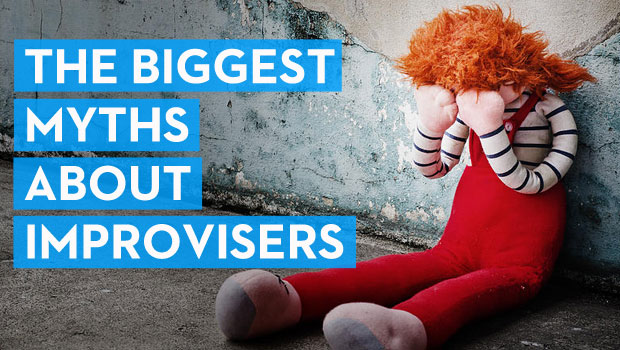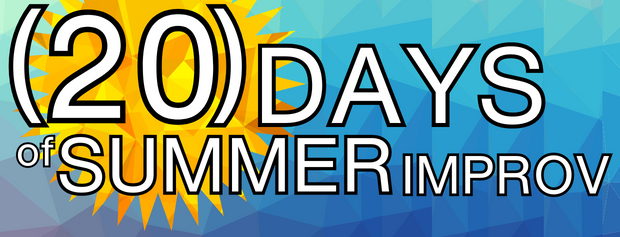There are several myths that surround improvisers. I went out on the In-Your-Face Street Beat to find and justify these collective beliefs because, as Sarah Silverman once said, "you can't smell yourself.”
Improvisers Can't Hold Down "Real" Jobs
To begin: Any job that gives you money for doing what they expect you to do should be considered a "real job."
While the traditional "starving artist" stereotype does exist, know that there are several improvisers who work as teachers, scientists, lawyers and at Groupon. Are they paying rent? Do they have money to wash their clothes? Feed themselves? Maybe it's just not the job you envisioned your partner/best friend/child/parent having while they actively pursue their dreams. That’s understandable, but it’s also something that’s out of your control.
Improvisers are creative types; they may consistently complain about the hundreds of tiny Chinese dumplings they sling to rich folk in the suburbs, but the money they're making is allowing them to pay bills while still maintaining flexibility to satisfy their true passions.
Improvisers Are Overly-Dramatic/Cray/Emotionally Unavailable
WHAT?! No. NO! Are we? But those three contradict! "Overly-dramatic" means exactly how I'm responding (thinking this through aloud, on the defense), "cray" means I would respond by laughing, shitting in my hand, then fashioning my feces into a meatloaf, wrapping it in an old t-shirt, putting it in the refrigerator, and then setting the house on fire with a lit goat (no patterns or rational thought processes). "Emotionally unavailable" might just mean that I'm being quiet because I don't know how to respond and being vulnerable is hard.
Oh, man. Now I'm in my head. Am I emotionally unavailable?
Here's what we're taught in improv: listen, respond.
Heard.
Response: I can understand where you're coming from. It's unusual to tell someone something and have them deliver a response completely off the top of their head. Sometimes, it's a different emotional response than the "norm," and sometimes there's no response at all. This can be true not just for improvisers, but all people. Lumping emotional responses into a category of profession is your ego trying to make sense of things. It's your classifying left brain working together with your emotional right. Congrats! You're human! And so are improvisers.
Improvisers Are Always “On"
I can understand this completely, because I've been surrounded by people doing bits. So many bits. Bits for days. Perhaps they make jokes when you're trying to be serious. Maybe they pretend to leave awkward situations by miming leaving a person-shaped hole in the wall. This is just our awkward way of trying to relate.
With other improvisers, these behaviors are seen as completely normal. It's like being at a table of chefs, and they're all talking about chef stuff, and you're like, "Hey, it really WAS awful. A-greed!" and then they all stare at you like you're an idiot, because it's “offal," and how did you get roped into a chef dinner, anyway?!
Saying improvisers are always “on” is like asking your communications degree friends, "Do you always just, you know, speak? It's like you're always trying to communicate. We get it. You have a communications degree." It's just what some improvisers do.
Improvisers Are Self-Deprecating/Depressed/Anxious
Some improvisers are also very happy on a daily basis. Your office has a person like that, too. They get up in the morning, make coffee, go for a run, drop the kids off, hit up the newest breakfast spot, grab donuts for the break room and are still ten minutes early to work— so they can stop by your desk and just. fucking. smile.
There are also improvisers (and other people in your neighborhood) that feel the opposite. I think there's a part of us all that feels sadness from time to time, and that's okay, as long as we're handling the feelings in a healthy way. Depression and anxiety are common, and if you're personally struggling with either, know that you're not alone, and help is always there if you ask for it. Regarding the stereotype, perhaps improvisers are just more outspoken about any and all feelings (as are writers, actors, babies and Mr. Van Driessen, Beavis and Butt-Head’s school psychologist).
How does that old saying go? "Sticks and stones may break my bones, but your words will never hurt me as much as the words I say to myself, and now I'm ruminating in my own self-deprecation; I should probably eat a bag of Oreos and laugh it off.”
Improvisers Are Heavy Drinkers/Partiers
This is like saying all bartenders and health care professionals are alcoholics— it's just not true. What people might be noticing is that the drinking habits are just different from theirs. Improv shows don't discriminate on performance days, so a drink or two after a great (or particularly bad) show might happen at 9pm on a Monday, when most of society's party times are traditionally on the weekend.
While some improvisers do partake in excessive amounts of alcohol and parties, there are several out there who don't. Some are even completely sober! Some will even go to all lengths to tell you about their new juice cleanse and P90X! We don't judge; any and all welcome! Just like America.
All Improvisers Want to Be on SNL
Imagine what you wanted to be as a child. Mine was "ballerina" paired with "own a motorcycle." I didn't know any specific ballerinas at that time, and I definitely wasn't old enough to own a motorcycle, so I settled for wearing a unitard and tights around the house and spinning until I was dizzy on the kitchen linoleum.
If you wanted to be a doctor, you'd probably been introduced to the field by a class that particularly interested you. A teacher may have changed your life, and you want to help change someone else's. Maybe you were someone who saw corrupt politicians and wanted to make changes in the way the government is run.
Now imagine if you wanted to be a "comedian." Who was your biggest comedy influence growing up? The Kids In The Hall? Monty Python? For most improvisers (who have dreamed of doing comedy for their entire lives), SNL was readily available. It was American. It was safe, so your parents let you watch it. Your parents watched it with you. Can you blame them for wanting to achieve that dream? While I've never made it to the Bolshoi Ballet, and cannot stand motorcycles (WHY ARE THEY SO LOUD?!), several colleagues have made it to SNL. It happens to improvisers, just as it happens to stand-up comics, writers, and character actors. Not everyone wants to work for Lorne Michaels, but I don't know a single person that would turn the job down, if offered.
Improvisers Will Never Grow Up
From the second we're toddlers, we're given rules, boundaries, and limits. Our jobs tell us we can't wear earrings longer than an inch, that marketing ideas "won't work," that reaching out to the local alderman "isn't worth it." Improvisers are taught to play, to say "yes," (and not just "yes," but "yes, and..."), to ask not only "why" but instill a "why not?" behavior. We're trained to explore, listen, take suggestions, go on tangents, respond, create, live, learn, observe, work together, think ahead, call back, and most importantly, laugh. If growing up is the opposite of that, even as an improviser, I gotta say, "no, thank you."
Nikki Pierce (@nikkinikkip) is a recent L.A. transplant (via Chicago) who currently spends her free time researching cures for sun delirium. If interested, you can properly stalk the rest of her work at nikki-pierce.com or nikki-pierce.tumblr.com.

 Shows & Tickets
Shows & Tickets  Chicago Venue Info
Chicago Venue Info  Classes & Education
Classes & Education  Second City Works
Second City Works  Second City Network
Second City Network  Our Legacy
Our Legacy 













